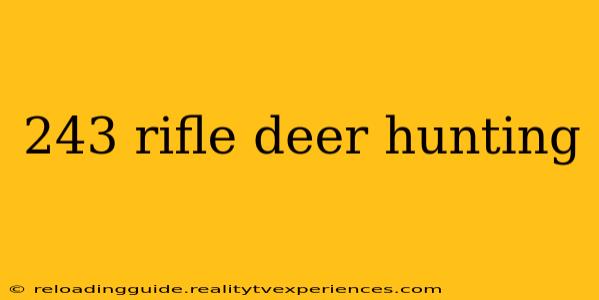The .243 Winchester, a lightweight and versatile cartridge, has earned a prominent place in the hearts of deer hunters across North America. Its manageable recoil, flat trajectory, and impressive accuracy make it a popular choice for both novice and experienced hunters. This guide delves into the specifics of using a .243 for deer hunting, covering ammunition selection, effective range, ethical considerations, and more.
Understanding the .243 Winchester Cartridge
The .243 Winchester, introduced in 1955, is a .24 caliber bottlenecked cartridge known for its accuracy and relatively low recoil. This makes it exceptionally suitable for hunters of all skill levels, particularly those new to hunting rifles. Its popularity stems from its effectiveness on deer-sized game within its optimal range, offering a balance of power and precision.
Advantages of the .243 for Deer Hunting:
- Low Recoil: The gentle recoil makes it easier to maintain accuracy, particularly during rapid shots or extended hunting sessions. This is especially beneficial for younger or smaller-statured hunters.
- Flat Trajectory: The .243's aerodynamic bullet design results in a flatter trajectory, meaning less bullet drop at longer ranges, simplifying aiming and shot placement.
- Accuracy: With proper ammunition and a well-maintained rifle, the .243 is renowned for its remarkable accuracy, increasing the chances of a clean, ethical kill.
- Lightweight: The cartridge's relatively light weight translates to a lighter overall rifle, beneficial for extended hunts requiring significant walking or carrying.
Disadvantages of the .243 for Deer Hunting:
- Limited Energy at Longer Ranges: While accurate, the .243's energy decreases more rapidly with distance compared to some larger calibers. This limits its effective range for deer hunting.
- Bullet Selection Crucial: Choosing the right bullet weight and type is crucial for maximizing effectiveness and ensuring humane kills. Using inappropriate ammunition can compromise the ethical aspects of hunting.
- Not Ideal for Extremely Large Deer: While capable of taking down deer, the .243 might be underpowered for exceptionally large or tough specimens, especially at longer ranges.
Choosing the Right Ammunition for Deer Hunting with a .243
Selecting the appropriate ammunition is paramount for a successful and ethical hunt. Factors to consider include:
- Bullet Weight: Bullet weights typically range from 55 to 100 grains. For deer hunting, weights between 85 and 100 grains are generally recommended for better penetration and energy transfer.
- Bullet Construction: Look for bullets designed for hunting, such as bonded or controlled expansion bullets. These ensure consistent expansion and penetration, leading to a quicker, more humane kill. Avoid full metal jacket (FMJ) rounds intended for target practice.
- Ballistic Coefficient: A higher ballistic coefficient indicates better aerodynamic performance, resulting in a flatter trajectory and less wind drift.
Effective Range and Shot Placement
While the .243 Winchester is accurate at longer ranges, its effective range for deer hunting is generally considered to be within 300 yards. Beyond this distance, energy and accuracy diminish significantly, compromising the ability for a clean and ethical kill. Accurate shot placement, focusing on vital organs like the heart and lungs, is crucial regardless of range.
Ethical Hunting Considerations
Ethical hunting is paramount. This includes responsible shot placement, understanding the .243's limitations, and ensuring a swift and humane kill. Never take a shot if you are unsure of your target or the shot's likelihood of success. Always prioritize ethical considerations over the desire for a trophy.
Conclusion
The .243 Winchester remains a popular and effective choice for deer hunting, particularly for those seeking a manageable recoil and high accuracy. By understanding its capabilities and limitations, selecting appropriate ammunition, and prioritizing ethical hunting practices, hunters can significantly increase their chances of a successful and responsible hunt. Remember to always consult with experienced hunters or professionals to further refine your knowledge and skills.

